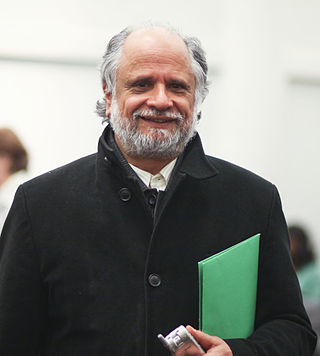Related Research Articles

Creationism is the religious belief that nature, and aspects such as the universe, Earth, life, and humans, originated with supernatural acts of divine creation. In its broadest sense, creationism includes a continuum of religious views, which vary in their acceptance or rejection of scientific explanations such as evolution that describe the origin and development of natural phenomena.

A society is a group of individuals involved in persistent social interaction or a large social group sharing the same spatial or social territory, typically subject to the same political authority and dominant cultural expectations. Societies are characterized by patterns of relationships between individuals who share a distinctive culture and institutions; a given society may be described as the sum total of such relationships among its constituent members.
Catachresis, originally meaning a semantic misuse or error—e.g., using "militate" for "mitigate", "chronic" for "severe", "travesty" for "tragedy", "anachronism" for "anomaly", "alibi" for "excuse", etc.—is also the name given to many different types of figures of speech in which a word or phrase is being applied in a way that significantly departs from conventional usage.

Frantz Omar Fanon was a French Afro-Caribbean psychiatrist, political philosopher, and Marxist from the French colony of Martinique. His works have become influential in the fields of post-colonial studies, critical theory, and Marxism. As well as being an intellectual, Fanon was a political radical, Pan-Africanist, and Marxist humanist concerned with the psychopathology of colonization and the human, social, and cultural consequences of decolonization.

Lamarckism, also known as Lamarckian inheritance or neo-Lamarckism, is the notion that an organism can pass on to its offspring physical characteristics that the parent organism acquired through use or disuse during its lifetime. It is also called the inheritance of acquired characteristics or more recently soft inheritance. The idea is named after the French zoologist Jean-Baptiste Lamarck (1744–1829), who incorporated the classical era theory of soft inheritance into his theory of evolution as a supplement to his concept of orthogenesis, a drive towards complexity.
Postcolonial literature is the literature by people from formerly colonized countries, originating from all continents except Antarctica. Postcolonial literature often addresses the problems and consequences of the decolonization of a country, especially questions relating to the political and cultural independence of formerly subjugated people, and themes such as racialism and colonialism. A range of literary theory has evolved around the subject. It addresses the role of literature in perpetuating and challenging what postcolonial critic Edward Said refers to as cultural imperialism.

The Wretched of the Earth is a 1961 book by the philosopher Frantz Fanon, in which the author provides a psychoanalysis of the dehumanizing effects of colonization upon the individual and the nation, and discusses the broader social, cultural, and political implications of establishing a social movement for the decolonisation of a person and of a people. The French-language title derives from the opening lyrics of "The Internationale", which is reflected in the English title as well.
A colonial mentality is an internalized ethnic, linguistic, or cultural inferiority complex felt by people as a result of colonization, i.e. being colonized by another people and gaslit into assimilation based on the belief that the language and culture of the colonizer are inherently superior to one's own. The term has been used by postcolonial scholars to discuss the transgenerational effects of colonialism present in former colonies following decolonization. It is commonly used as an operational concept for framing ideological domination in historical colonial experiences. In psychology, colonial mentality has been used to explain instances of collective depression, anxiety, and other widespread mental health issues in populations that have experienced colonization.

Homi Kharshedji Bhabha is an Indian scholar and critical theorist. He is the Anne F. Rothenberg Professor of the Humanities at Harvard University. He is one of the most important figures in contemporary postcolonial studies, and has developed a number of the field's neologisms and key concepts, such as hybridity, mimicry, difference, and ambivalence. Such terms describe ways in which colonised people have resisted the power of the coloniser, according to Bhabha's theory. In 2012, he received the Padma Bhushan award in the field of literature and education from the Indian government. He is married to attorney and Harvard lecturer Jacqueline Bhabha, and they have three children.
Biopolitics is a concept popularized by the French philosopher Michel Foucault in the mid-20th century. At its core, biopolitics explores how governmental power operates through the management and regulation of a population's bodies and lives.
Existential phenomenology encompasses a wide range of thinkers who take up the view that philosophy must begin from experience like phenomenology, but argues for the temporality of personal existence as the framework for analysis of the human condition.
Lewis Ricardo Gordon is an American philosopher at the University of Connecticut who works in the areas of Africana philosophy, existentialism, phenomenology, social and political theory, postcolonial thought, theories of race and racism, philosophies of liberation, aesthetics, philosophy of education, and philosophy of religion. He has written particularly extensively on Africana and black existentialism, postcolonial phenomenology, race and racism, and on the works and thought of W. E. B. Du Bois and Frantz Fanon. His most recent book is titled: Fear of Black Consciousness.
In linguistics, relexification is a mechanism of language change by which one language changes much or all of its lexicon, including basic vocabulary, with the lexicon of another language, without drastically changing the relexified language's grammar. The term is principally used to describe pidgins, creoles, and mixed languages.

Third-worldism is a political concept and ideology that emerged in the late 1940s or early 1950s during the Cold War and tried to generate unity among the nations that did not want to take sides between the United States and the Soviet Union. The concept is closely related but not identical to the political theory of Maoism–Third Worldism.

The lord–bondsman dialectic is a famous passage in Georg Wilhelm Friedrich Hegel's The Phenomenology of Spirit. It is widely considered a key element in Hegel's philosophical system, and it has heavily influenced many subsequent philosophers.
Postcolonialism is the critical academic study of the cultural, political and economic legacy of colonialism and imperialism, focusing on the impact of human control and exploitation of colonized people and their lands. The field started to emerge in the 1960s, as scholars from previously colonized countries began publishing on the lingering effects of colonialism, developing a critical theory analysis of the history, culture, literature, and discourse of imperial power.
Africana philosophy is the work of philosophers of African descent and others whose work deals with the subject matter of the African diaspora. The name does not refer to a particular philosophy, philosophical system, method, or tradition. Rather, Africana philosophy is a third-order, metaphilosophical, umbrella-concept used to bring organizing oversight to various efforts of philosophizing. Africana philosophy is a part of and developed within the field of Africana studies.

Postcolonial international relations is a branch of scholarship that approaches the study of international relations (IR) using the critical lens of postcolonialism. This critique of IR theory suggests that mainstream IR scholarship does not adequately address the impacts of colonialism and imperialism on current day world politics. Despite using the language of post-, scholars of postcolonial IR argue that the legacies of colonialism are ongoing, and that critiquing international relations with this lens allows scholars to contextualize global events. By bridging postcolonialism and international relations, scholars point to the process of globalization as a crucial point in both fields, due to the increases in global interactions and integration. Postcolonial IR focuses on the re-narrativization of global politics to create a balanced transnational understanding of colonial histories, and attempts to tie non-Western sources of thought into political praxis.

Decoloniality is a school of thought that aims to delink from Eurocentric knowledge hierarchies and ways of being in the world in order to enable other forms of existence on Earth. It critiques the perceived universality of Western knowledge and the superiority of Western culture, including the systems and institutions that reinforce these perceptions. Decolonial perspectives understand colonialism as the basis for the everyday function of capitalist modernity and imperialism.

Toward the African Revolution is a collection of essays written by Frantz Fanon, which was published in 1964, after Fanon's death. The essays in the book were written from 1952 to 1961, between the publication of his two most famous works, Black Skin, White Masks and The Wretched of the Earth. Fanon expands on the themes of colonization, racism, decolonization, African unity, and the Algerian Revolution in the essays, most of which come from his time writing for El Moudjahid, the official newspaper of the FLN.
References
- ↑ Debrett's People of Today, 2010.
- 1 2 D'Haen, Theo (February 2005). "Introduction. What the postcolonial means to us: European literature(s) and postcolonialism". European Review. 13 (1): 73–78. doi:10.1017/S1062798705000074. S2CID 145609522. ProQuest 217337960.
- ↑ "Entry trans". robertjcyoung.com. Archived from the original on 23 November 2007.
- ↑ "British Academy Welcomes 59 New Fellows".
- ↑ "Wadham's people".
- ↑ "People". 6 July 2015.
- ↑ Young, Robert (1990). White mythologies: writing history and the West. London; New York: Routledge. p. 232. ISBN 978-0-415-05371-6. LCCN 90032948. OCLC 21195269. Also published in paperback as ISBN 978-0-415-05372-3.
- ↑ Young, Robert J.C. (1995). Colonial desire: hybridity in theory, culture, and race. London; New York: Routledge. p. 236. ISBN 978-0-415-05373-0. LCCN 94015815. OCLC 30318652. Also published in paperback as ISBN 978-0-415-05374-7.
- ↑ Young, Robert J.C. (2001). Postcolonialism: an historical introduction. Oxford, United Kingdom; Malden, Massachusetts: Blackwell Publishers. p. 498. ISBN 978-0-631-20070-3. LCCN 00010583. OCLC 44634246. Also published in paperback as ISBN 978-0-631-20071-0.
- ↑ McDevitt, Patrick F (2002). "Postcolonialism: An Historical Introduction (review)". Journal of Colonialism and Colonial History. 3 (3). doi:10.1353/cch.2002.0069. S2CID 162365330. Project MUSE 38083.
- ↑ "From redeeming Gandhi to creating Latin America". 18 April 2003.
- ↑ Young, Robert J. C. (2003). Postcolonialism: a very short introduction. Very short introductions, 98. Oxford; New York: Oxford University Press. p. 180. ISBN 978-0-19-280182-1. LCCN 2004296289. OCLC 51001171.
- ↑ Young, Robert J. C. (2008). The idea of English ethnicity. Malden, Massachusetts: Blackwell. pp. 291. ISBN 978-1-4051-0128-8. LCCN 2007008016. OCLC 85485143. Also published in paperback as ISBN 978-1-4051-0129-5.
- ↑ Ferguson, Christine (October 2008). "Robert J. C. Young. The Idea of English Ethnicity. Oxford: Blackwell Manifestos, 2007. Pp. 291. $34.95 (paper)". The Journal of British Studies. 47 (4): 983–985. doi:10.1086/592932. S2CID 140953965.
- ↑ Kumar, Krishan (7 June 2010). "Negotiating English identity: Englishness, Britishness and the future of the United Kingdom: Negotiating English identity". Nations and Nationalism. 16 (3): 469–487. doi:10.1111/j.1469-8129.2010.00442.x.
- ↑ Khalfa, Jean; Young, Robert J. C. (2015). Frantz Fanon, Écrits sur l'aliénation et la liberté, Œuvres II. Paris: La Découverte. p. 677. ISBN 978-2707186386. LCCN 2015529954. OCLC 930770745.
- ↑ "Écrits sur l'aliénation et la liberté".
- ↑ "Alienation and Freedom".